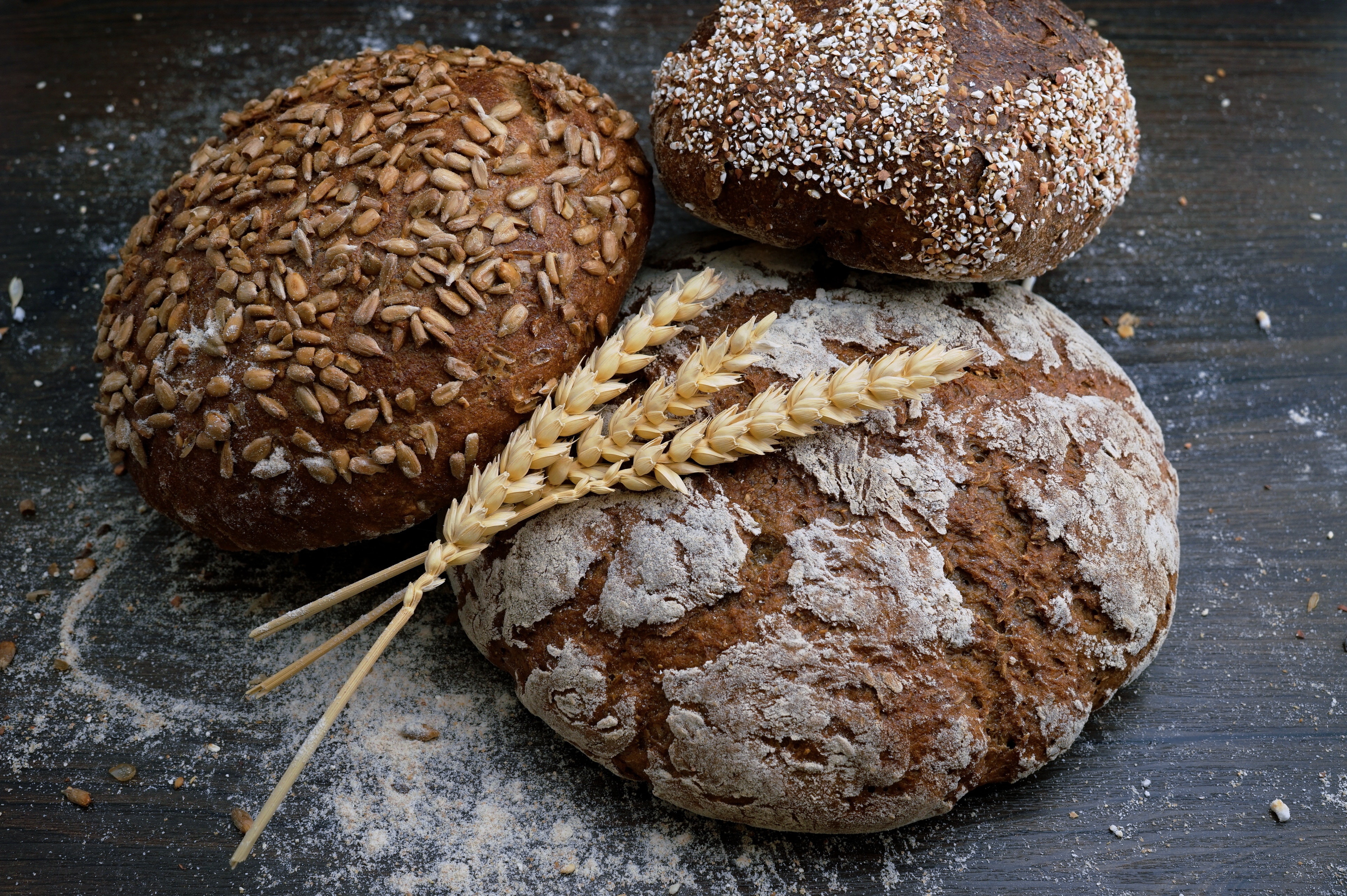Over the next Sundays, you will hear a lot about the Jesus Christ, the bread of life. I have to admit that I am relieved that I don’t have to preach 4 times on this subject matter, because talking so much about bread would go stale quickly – pun intended. The next two Sundays, I’ll be on vacation, and my dear colleagues Pr. Peter Krey and Pr. Lyle Beckman will tackle Jesus’ sayings about the bead of life and what it means to them.
So today’s sermon is about Jesus Christ, the bread of life; Part I: Introduction.
Bread in various forms is a staple of many cultures and has been for millennia. Bread, in fact, is the first processed food in human history. Archeologists have found what they think is bread crumbs from a site in what today is Jordan, and these crumbs have been dated to about 14,000 B.C. That’s roughly 4,000 years before agriculture emerged in the so-called Fertile Crescent in Central West Asia, of which modern day Jordan was a part. So even hunter-gatherers quickly figured out how to grind the wild grains they found – wheat, barley, and oats, among others – and transform them into a food item that is high in calories. Today we think ‘high calorie’ is bad, and that we should avoid carbs at all cost; but in those early days, when food wasn’t by far as abundant as it is today, and one had to work hard for it, having a food with high calorie content was crucial for survival.
And bread was made in many ancient cultures around the world, from India to Europe to the Americas. That’s why, today, bread comes in all shapes and sizes: we have pita bread, Challah bread, tortillas, matzah, Pumpernickel, Baguette, naan, bagels – the list goes on and on. The Germans especially have made an art form out of the baking of bread; there are roughly 600 main types of bread in Germany alone.
Bread is so important as a human food that in certain cultures is has become synonymous with food: the people of Israel in the wilderness were crying out to Moses to give them bread when they were hungry, and the mysterious substance God provided was called bread from heaven; and we still pray today in the Lord’s Prayer, ‘give us this day our daily bread’ – meaning, give us our daily food, our daily sustenance. When we talk about an area where agriculture thrives, we talk about a ‘breadbasket’; even California has been dubbed the ‘breadbasket of the world’, even though very few of the crops grown here are actually used for breadmaking.
So I think we get it: bread is an integral part of human life in many areas and cultures around the world. In fact, it is so important that, as we heard in last Sunday’s gospel about the feeding of the 5,000, the people whom Jesus feeds miraculously with bread out in the wilderness want to make him king – which means, they want to put him in charge of being their predictable and reliable provider.
That’s the setup for today’s gospel lesson: the very same people chase Jesus down after he gets away from them. They don’t give up on the idea that Jesus can give them what they need, what they want. And that’s why Jesus says, ‘You are just following me because I filled your bellies, and that’s what you are after. But I have much more and something more important to offer: myself. I am the bread of life. Whoever comes to me will never be hungry.’
I am the bread of life. Jesus touches on essential human needs: human hunger, survival, life itself. And he makes the bold claim: I can still your every hunger, I can give you the sustenance you need. I can give you life beyond mere survival – life to the fullest, eternal life.
Sending the Son into this world, God provides humanity with that bread of life. I don’t think Jesus’ birthplace is accidental: as we know from the Christmas story, he was born in Bethlehem, which is Hebrew and means: house of bread. Here we already have a portent of Jesus’ mission: to be bread for the world.
And still today, we partake in a ritual in which we break the bread of life, as we share table fellowship in communion. We understand how important this bread is Christ offers. But those people Jesus preached to in Galilee had trouble with the notion of Jesus, the bread of life. That was something new, something they could not grasp, something that they maybe took too literally. And, as we will see later in this series on Christ, the bread of life, they are offended, they are turned off, and end up keeping on searching for something that fills them. They can’t understand how Jesus has something to offer that gives fulfillment beyond a full belly and the basic needs of life. You will hear more about that on the coming Sundays.
Let me shift gears here. Now as I was doing my research for today’s sermon, I came across something that really stunned me -and that shows me that God has a sense of purpose and a sense of humor. Last Sunday, we heard how the masses wanted to make Jesus king – their ruler. And, ultimately, Christ was revealed to be king and Lord of all. And, yes, it has something to do with bread. Bear with me.
Now the Greek word for Lord, ‘kyrios’ (as in Kyrie eleison, Lord, have mercy) means something like the exalted one, someone whose standing is higher. The Latin word for Lord, ‘Dominus’, is most likely related to ‘domus’, which is ‘house’; and ‘domus’ derives from an even older Indo-Germanic word for ‘subdue’ – and that’s where our word ‘dominate’ comes from. The domus, the house or household, was a place where there were subdued –domesticated – animals, and then most likely also subdued people: slaves. So in the Latin, a Lord originally was someone who owns a house, a household, and has responsibility for this household. The German word for Lord, ‘Herr’, most likely derives from the Latin word ‘senior’, which literally means older than old, or: really old. We also have the words ‘seniore’ and ‘senor’ in Italian and Spanish, respectively. So we see that, in different languages, ‘Lord’ has actually different meanings.
But have you ever asked yourself where the English word ‘Lord’ comes from? I was surprised and delighted to learn that it comes from the old English ‘hlafwaerd’ – and with a little imagination, we can guess what this means. ‘Hlaf’ is ‘loaf’ – the old English word for bread, which is still in use today – and ‘waerd’ is ‘warden’ or ‘keeper’. So the word ‘Lord’ means ‘keeper of the bread’ – in ancient times, this was the landowner who would command over servants and reap the bounty of the harvest, but in turn would be responsible for feeding all members of his extended household, including servants.
And, just as an aside, the word ‘lady’ comes from the old English ‘hlafdige’ – the loaf kneader. In short, the lady produced the bread, and the lord would administer it. Together, they provided the daily bread.
Yes, lord and lady had an elevated status, but their lord- and ladyship was based on a social contract; people submitted to and worked for a lord, and the lord knew that is was in his best interest to keep the servants fed well and distribute the daily bread fairly so that they were able to produce. The survival of the entire household, the entire tribe, the entire village depended on it.
That’s why I said earlier that God has a special sense of purpose and humor: whenever we address Christ as Lord, we acknowledge that he is the loaf-keeper, the one who provides the bread of life for all in his household; who gives himself so that all may live.
The title ‘Lord’ reminds us that Christ is exalted and has ultimate power – but also that Christ cares about the relationship with all of us, that Christ cares about our needs, and shares freely all that we truly need: love, forgiveness, grace, mercy – and a place in God’s household, God’s kingdom of justice and peace, where everyone will be fed and filled and hunger will be no more.a
All this is offered to us when we break bread together in Christ’s name.
Picture by Wesual Click on unsplash.com





